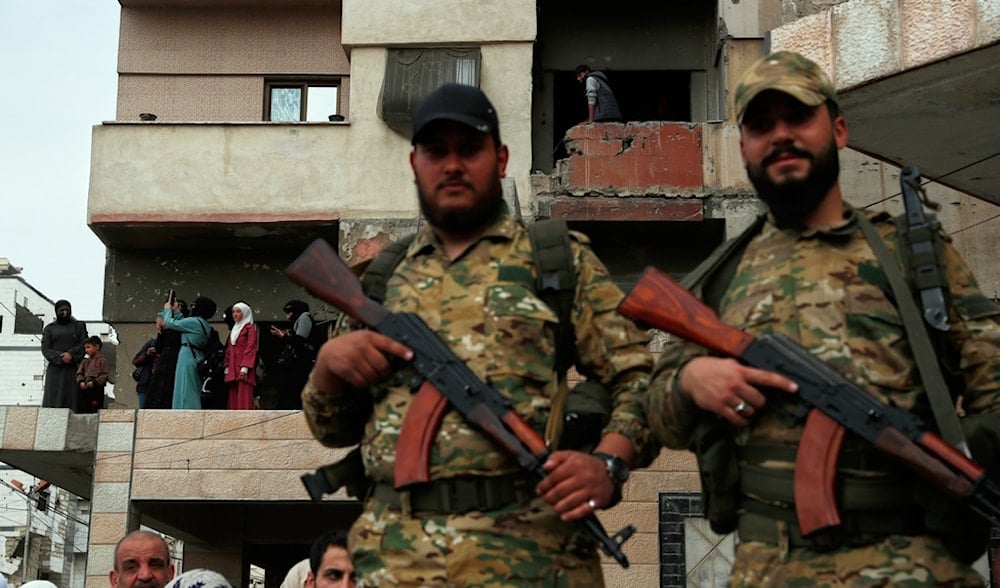SOHR warns of massacre threats in Syria's Homs, coastal regions
The Syrian Observatory for Human Rights has issued a dire warning and information regarding armed groups threatening civilians with mass killing if their demands are not met.
-

Syrian government security forces and civilians gather in the town of Douma, in the eastern Ghouta region, near the Syrian capital Damascus, Syria, on Monday, April 7, 2025. (AP)
Violations against civilians are escalating in certain areas across the Homs countryside and coastal villages in Syria through new methods of extortion and threats that raise alarms of severe humanitarian consequences and represent a clear breach of international humanitarian law and human rights principles, according to the Syrian Observatory for Human Rights.
Citing documented testimonies from eyewitnesses in the village of Jeblaya in rural Homs, the Observatory reported that residents were directly threatened by armed groups demanding payments equivalent to the value of 300 military-grade weapons, despite the villagers not possessing any.
The threat included bringing an armed faction into the village if the demand was not met, with the possibility of committing mass killings, prompting a significant portion of the population to flee in fear.
In a similar incident, local sources from the village of Al-Hattaniya, near Baniyas, said residents were given a choice: either pay 60 million Syrian pounds or face the entry of an armed group into their village.
'Crimes against humnanity'
In this context, the Syrian Observatory for Human Rights strongly condemned these practices, calling them “acts of intimidation, terror, and extortion that endanger civilian lives and safety, and constitute serious human rights violations that may amount to crimes against humanity if they continue and become systematic.”
The Observatory stated that “the continuation of these practices, which terrorize civilians and fuel fear and chaos, does not serve the ruling authority but rather benefits its opponents and deepens divisions and mistrust.”
It called on the investigative committee formed by Syria's President, Ahmad al-Sharaa, to take the issue of massacres and mass killings, particularly those documented in March, seriously and decisively, as they continue systematically.
The Observatory also questioned the committee’s operations and its mechanisms in light of ongoing crimes with no accountability or deterrence, asking, "How does the committee operate? How transparent is it? And how can its investigation results be trusted while killings and forced displacements continue without pause or justice?"
Moreover, the Observatory urged Syrian authorities and the Ministry of Defense to remove undisciplined elements from these areas and replace them with personnel capable of restoring security and stability, conditions that would allow displaced people to return and help restore a sense of safety in the coastal provinces, which are still gripped by threats and systematic killings, particularly targeting members of the Alawite community.
The acts of genocide carried out against Alawites in Syria’s coastal region take many forms beyond systematic killing, according to the report. They include horrific physical abuse, arbitrary arrests, forced disappearances, and the deliberate destruction of private and public property, such as homes, vehicles, and vital infrastructure, in what the Observatory coined as a campaign of systematic ethnic cleansing.
The tragedy is further exacerbated by the inability of humanitarian organizations to access impacted areas due to logistical and security complications, depriving survivors of even the most basic necessities and turning entire regions into isolated zones abandoned to fear and death.
Syrian activists speak out
Recently, a group of activists from the Suweida region, who were arbitrarily detained by Syrian General Security, spoke out about the violations and abuses they endured.
The activists were received on Monday by Suweida Governor Mustafa Bakour at the governorate building, where they discussed the mistreatment they had faced.
During the meeting, one of the activists, Ghada al-Shaarani, revealed details of the abuses, including beatings, particularly targeting women and directed at the head, as well as death threats.
Al-Shaarani indicated that these actions had sectarian undertones, specifically targeting members of the Alawite and Druze communities. She emphasized that what happened constituted a violation of the constitutional declaration, which she categorically rejected in its entirety.
Read more: Damascus says investigating reports of war crimes on Syrian coast

 4 Min Read
4 Min Read










